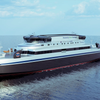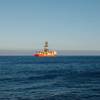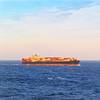(The following is a statement of Senator Ernest F. Hollings for a Hearing on Transportation Security)
On Sunday night, the President announced that the Administration will be looking for an additional $87 billion for Iraq. This would bring the total amount spent there to over $160 billion. This request alone represents three times the amount the President requested for our nation's homeland security efforts this year.
I was reluctant to create a Department of Homeland Security, because I felt bureaucratic reshuffling without adequate planning and expertise would detract from our ability to fight terrorism. But we are stuck with what we have, and now the Administration must take the steps necessary to make this bureaucracy work.
Now, I realize you all have to deal with OMB and the White House for your budgets, but the dramatic underfunding of key transportation security initiatives is creating disasters just waiting to happen all across the country. Your agencies have a long way to go before you can claim coordinated integration or that you've overcome petty bureaucracies. While we have some good people working on the problems, the Administration has not dedicated the resources necessary to help you get the job done.
When it comes to port security, this Administration still hasn't gotten serious about it. The President continues to be long on rhetoric and photo-ops, and short on substance and resources for our ports. He's busy taking pictures with the Coast Guard at the Port of Philadelphia, yet he hasn't provided that same port the funds needed to comply with its federally approved security plan. In fact, we aren't even providing funding for the Coast Guard to review the security plan. That's shameful.
This year, the President's budget had not one penny explicitly provided to help ports comply with the federal mandates for maritime security. When we passed the Maritime Transportation Security Act, the Senate insisted on a user fee. The House refused, so to help pass the bill, I relented. I was convinced that passage of the authorizing legislation was too important, and that, ultimately, Congress and the Administration would make certain that we paid for it. Forget it. This Administration was too busy focusing on tax cuts, and despite my repeated attempts to lock down specific funding, I have not been able to get this Congress to include the needed resources in appropriations.
But that is water under the bridge at this point. We have to develop a secure transportation system. Following September 11th, the public made it clear that they would not get back onto planes without an enhanced security system. Transportation security is real and tangible to the American people. They're experiencing it in their daily lives and in the way they conduct business. They should not have to fear getting on an airplane, or riding Amtrak, or traveling through the Holland Tunnel from New Jersey into Manhattan.
Our witnesses sit here today having done a commendable job with what they have been provided. Over the past year and a half almost all reports suggest that under the guidance of Admiral Loy, aviation security has improved dramatically, that the screening workforce is well trained and doing a good job. But funding remains critical. You cannot take the aggressive steps needed for cargo security, for research on new explosive detection systems, and for training of Federal Air Marshals without the money. You cannot run an agency when Congress is putting in artificial staffing caps, forcing you to "right size" the screener workforce that will result in longer lines at the airports. That makes no sense. I know you have to do what you are told. We both understand that.
We have a long way to go at our seaports. The Coast Guard has stepped up to its new responsibilities with its usual can do attitude, but I have very serious concerns about your ability to effectively implement the new Maritime Security Transportation Act and secure our ports. The funding simply isn't there. We've provided billions for aviation, but in two years following September 11th, less than $300 million has been delivered to our ports. And the Coast Guard has estimated that it will cost over a billion dollars this year alone to meet the mandates in the new law.
For instance, the Act mandated certain large commercial vessels carry transponders to allow us to monitor their movements, to help ensure an oil tanker was not hijacked and run into one of the many nuclear reactors and energy facilities located on our navigable waterways. Yet the President's budget included only $1 million to actually purchase the towers and equipment necessary to start monitoring maritime vessels. At OMB's insistence, they proposed delaying this project until 2007. Their short-sightedness is hard to believe. While I am pleased that the Coast Guard receives an increase in your budget, I would say this increase is long overdue. But it is still unclear if this increase is enough to ensure all of the Coast Guard's security and non-security missions are adequately funded.
In general, I have substantial concerns about the whole surface transportation security issue as well. We need to do more in this area. The rail system traverses the entire nation, and our passenger rail service operates through and under many of the most important structures in the nation. We need to have a plan. And we need to follow through with the necessary resources to secure this system, as well as our other surface modes that move 800,000 shipments of hazardous materials annually.
None of us wants to shortchange transportation security, but this Administration has to let you do your job and provide the resources necessary to build a secure system. It is the responsibility of government to ensure the safety and security of our country, and our transportation system is at the critical core of that security. Right now, our transportation system remains vulnerable and the threat risk is high. This is placing increased demands on government, and it requires substantial public resources to meet those demands. We can't play games and go around yelling for more tax cuts. We have to find a way to pay for these immediate security needs before it's too late. The security of our people and the strength of our economy depend on it.
Sponsored Content
Chris-Marine’s solutions help to prolong engine lifetime

March 2024
 Read the Magazine
Read the Magazine

 Read the Magazine
Read the Magazine
This issue sponsored by:

Inland Waterways Focus: The Pacific Northwest Columbia-Snake River System
Subscribe for
Maritime Reporter E-News
Maritime Reporter E-News is the maritime industry's largest circulation and most authoritative ENews Service, delivered to your Email five times per week










